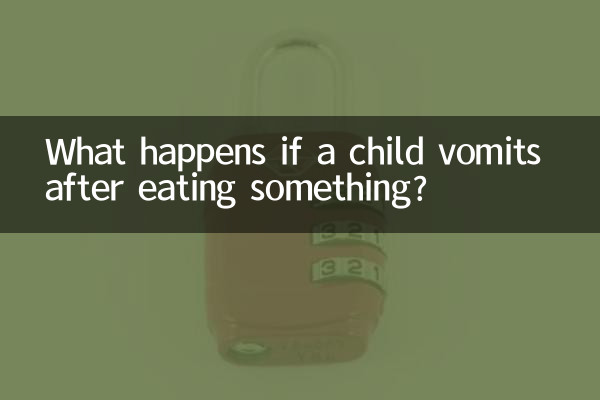What happens if a child vomits after eating something?
Recently, many parents have reported on social platforms and parenting forums that their children vomit after eating, which has attracted widespread attention. This article will combine the hot topics and hot content on the Internet in the past 10 days to analyze the possible causes, countermeasures and related data of this phenomenon.
1. Analysis of recent hot topics

By searching the Internet data of the past 10 days, it was found that discussions about "child vomiting" mainly focus on the following aspects:
| topic type | Discussion popularity | main focus |
|---|---|---|
| viral infection | high fever | Vomiting caused by norovirus, rotavirus, etc. |
| dietary problems | medium heat | Food allergies, indigestion, improper feeding |
| psychological factors | low fever | Stress vomiting, anorexia |
| Other diseases | medium heat | Gastroenteritis, intestinal obstruction and other organic problems |
2. Analysis of common causes
1.viral infection: Winter is the period of high incidence of norovirus and rotavirus, and these viral infections are often accompanied by symptoms such as vomiting and diarrhea.
2.food allergy: Common allergens such as milk protein, eggs, seafood, etc. may trigger vomiting reactions.
3.Improper feeding: Overfeeding, eating too fast, food temperature discomfort, etc. may lead to vomiting.
4.Gastrointestinal disorders: Children’s digestive systems are not fully developed and are prone to functional indigestion.
3. Parent’s Guide to Response
| Symptoms | Recommended actions | Things to note |
|---|---|---|
| Occasional vomiting, but still in good spirits | Stop eating for 2-3 hours and add a small amount of electrolyte water | Observe whether vomiting continues |
| Frequent vomiting with fever | Seek medical attention promptly to check for infectious factors | Record vomiting frequency and temperature changes |
| Vomit containing blood or bile | Immediate emergency treatment | Be alert to emergencies such as intestinal obstruction |
| Loss of appetite after vomiting | Start with a liquid diet and gradually resume your diet | Avoid forced eating |
4. Recent relevant statistics
According to recent outpatient data from a pediatric hospital:
| age group | Proportion of vomiting cases | Main diagnosis | average recovery time |
|---|---|---|---|
| 0-1 years old | 32% | Feeding problems, viral infections | 2-3 days |
| 1-3 years old | 45% | Viral infections, food allergies | 3-5 days |
| 3-6 years old | 18% | Gastroenteritis, psychological factors | 1-2 days |
| 6 years and above | 5% | food poisoning, other diseases | It depends on the situation |
5. Expert advice
1.keep Calm: Most children's vomiting is self-limiting, and excessive stress will increase the child's psychological burden.
2.Prevent dehydration: Using oral rehydration salts (ORS) is more effective than simply drinking water. Feed 5-10ml every 10-15 minutes.
3.diet modification: BRAT diet (banana, rice, apple puree, toast) is recommended during the recovery period and avoid greasy food.
4.Indications for medical treatment: If you have symptoms such as persistent vomiting for more than 24 hours, significant decrease in urine output, lethargy, or sunken fontanelle, you should seek medical attention promptly.
6. Netizens’ experience sharing
Practical advice collected from major parenting communities:
- Clean your mouth first after vomiting to avoid residue that may stimulate vomiting again
- Use caution when applying ginger slices to your belly button, as it may cause skin allergies.
- Keep a food diary to help doctors quickly determine allergens
- Prepare a special vomit bag for emergency use when going out
Conclusion: The causes of vomiting in children are complicated. Parents should neither take it lightly nor panic excessively. Through scientific observation and timely intervention, most situations can be properly handled. If symptoms persist or worsen, it is important to seek professional medical help.

check the details

check the details